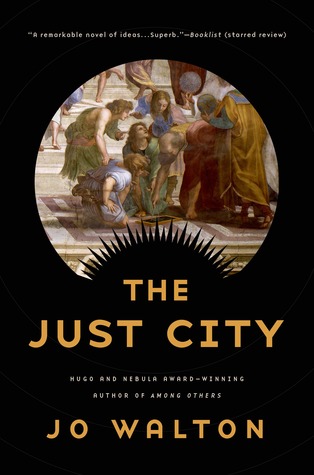When I discovered the existence of this novel , I had forgotten how I felt about Plato's Republic when I was fifteen. I was curious about what Jo Walton would do with her re-creation of Plato's idea of utopia. It did seem like an original concept.

What I liked most about the concept when I picked up the book is that the city was established by the Goddess Athena. I thought that was immensely cool ! What I disliked about it is that Plato's Republic was being conflated with Atlantis which Plato wrote about in the Timaeus and Critias dialogues.
Plato described Atlantis as being a maritime power that was the rival of Athens which the Gods destroyed. A civilization that rivaled Athens brings to mind the legend of Theseus. The Minoans were so powerful that they could demand the youths of Athens as tribute. Prince Theseus was sent as tribute to King Minos. He was supposed to be sacrificed to the Minotaur at the heart of the Minoan labyrinth. Many of us know how he survived the Minotaur with the help of the Minoan Princess Ariadne.
Another thing that is known about the Minoan civilization is that it was destroyed by a massive eruption of the volcano on the island of Santorini which was definitely occupied at the time. The Minoans wrote in a script called Linear A which has no similarity to any known language. It still hasn't been deciphered. This leads scholars to the conclusion that the Minoans certainly weren't Greeks. Later the script changed to Linear B which was discovered to be a form of Greek. The islands that had once been ruled by the Minoans had been conquered by the Greeks, but that was a post-eruption development. I am not the only one who believes that Plato was describing the Minoan Civilization. There are numerous scholars who have identified Santorini as Atlantis.
So as I started reading The Just City there was this niggling voice in my head, asking what Athena had done with the Minoans who would have inhabited the island where she had built her re-creation of Plato's Republic. That voice never went away. I kept wondering why those of the characters who had read the Timaeus and the Critias dialogues weren't bringing up the original inhabitants of the island. Socrates was a character in the novel. Wouldn't he have been asking what happened to them?
I did see references to Thessaly as the location in the novel. So it occurred to me that the Goddess Athena had placed The Just City on an uninhabited island in the Thessalian Sporades. Yet I couldn't find an island in the Sporades with a volcano. Walton's fictional island did come equipped with a volcano, and the plot required it to have one. So a Sporades island didn't quite fit. Walton really needed Santorini, the Minoan inhabited island whose shape changed radically around 1500 B.C.E. as a result of one of the worst eruptions in history.
Why couldn't I just relax and go along for the ride? Maybe it's because I'm like the ever questioning Socrates. When I was a fifteen year old I just loved Socrates. In fact, I wrote a play based on a few of Plato's dialogues called Socrates of Athens. Like the Minoan civilization, this piece of juvenilia no longer exists.
I did go along for the ride to some extent. Walton created some wonderful female characters who were part of this Goddess given experiment. The Goddess herself wasn't one of them. I was delighted by several human women who were brought to the island from various eras. These were women who were non-conformists within their own historical periods. They longed for the equality that Plato promised women in his republic. For their sake, I wished that I could believe that Athena's experiment would succeed. The Just City did initially seem like an improvement to these women who came to instruct the children, and identify the ones who could be potential philosophers.
Yet as their pupils grew, the instructors encountered heartbreaking dilemmas in their lives that were by no means utopian. The responsibility for many of the problems could be laid at Plato's door. They were inherent flaws in his concept of the republic that I noticed when I was fifteen.
I didn't expect to find the God Apollo sympathetic. His track record with regard to women in the myths about him was abominable. Yet in this book, Apollo wants to understand why one of those legendary women in Apollo's myths decided to become a tree. He eventually learns the answer and it results in a radical change in his outlook. I also really liked Apollo's unwavering support for Socrates who uncovered a major fault line in Athena's re-creation of Plato's Republic for which Plato couldn't be blamed.
As I was approaching the end of the book, I thought to myself that I could lay aside my obsession with historical detail because the book was so well-written and dealt with the issues that arose in this attempt at utopia in a complex and thought provoking manner. Unfortunately, the abrupt ending annoyed me so much that I nearly canceled my plans to read the sequel. And I still want to know where that grey eyed Goddess of wisdom mislaid the Minoans.

No comments:
Post a Comment